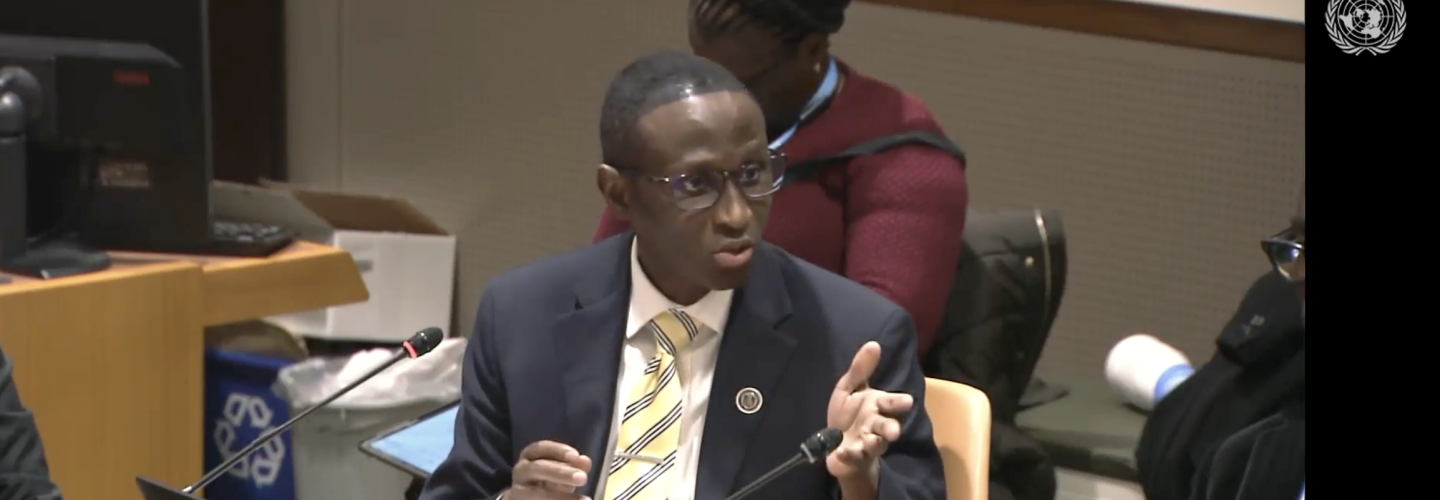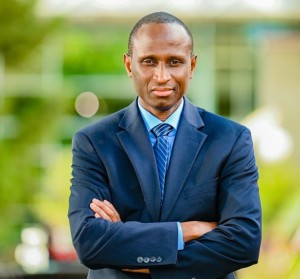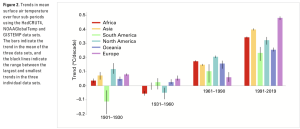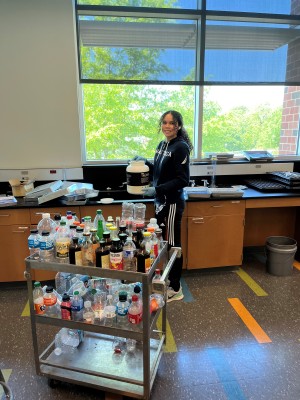
New York City, N.Y./April 23, 2024 – For years, scientists everywhere have warned of the disastrous impacts of climate change on the Earth.

Despite several calls to action, many nations have done little to address the issue. Dr. Thierno Thiam, provost and Chief Academic Officer at Johnson C. Smith University was invited to speak on an underrepresented people who are facing the brunt of the climate change crisis: women in Africa.
“The science is settled on the issue of climate change, but the politics are not,” he said. “We’ve created political systems where people literally buy their way into the system. The reason why it has become more critical is now we are now adding to the existing problem of climate change and additional challenges for women. If or when we lose this challenge, we may not have the opportunity to fight for another day.”
Thiam spoke at the Economic Empowerment of Women of African Descent in the Struggle for Climate Justice forum. The forum brought together students and experts in related fields who discussed strategies to promote both gender and racial equality in the context of climate change.
According to NASA, there is no doubt that the Earth is warming at an unprecedented rate, with human activity such as industrial manufacturing, deforestation, and varying forms of transportation.
But the United Nations is particularly worried about the continent of Africa, the majority of which is sub-Saharan or regions that lie south of the Sahara Desert.

The United Nations says that “Increasing temperatures and sea levels, changing precipitation patterns and extreme weather are threatening human health and safety, food and water security and socio-economic development in Africa.”
“Some parts of Africa are already uninhabitable,” said Thiam. “There are also countries that are planning to evacuate if things don’t change.”
The forum specifically focused on climate change and women in agriculture. Climate change has impacted Africa deeply, even though Africa is responsible for less than 2 percent of all carbon emissions in the world.
This has left African land much less fruitful, causing food production to decrease. This uniquely affects women in Africa because they are responsible for 80 percent of the continent’s food production, and 60 percent of employed women work in agriculture.
Women are also less likely to have access to financial and social assets like legal services, land tenure, political participation, governance and infrastructure. African countries finally allowed women to join the conversation in 2022.
“African societies used to be matriarchal, but then there was a shift,” explained Thiam. “The issues in our world are always undergirded by political or economic powers. What remains constant in both of those issues are that men dominate the field. You can never speak for someone else if you have never lived in their shoes.”
Thiam says a change can only be made when the affected populations are allowed a seat at the table.
“We won’t solve this issue until we decide we are going to give women the agency they need to help solve the crisis,” he said at the forum. “As a man, I’m here to say that it is the business of every man to give women the agency they deserve for this crisis to be solved.”
The answer to addressing climate change, according to Thiam, is two-fold: education and advocacy. After all, no one can address an issue if they don’t know there is one.
However, the monumental task of reversing the climate crisis has caused many to wonder if they can truly make a difference through small lifestyle changes that will improve the earth.
Dr. Mark Dugo, director of JCSU’s Center for Renewable Energy and Sustainability (CRES), says that the power of one can make a difference.
“Knowing what one person can do to make a difference in contributing to a more sustainable future is a testament to the power of one,” said Dugo. ‘Out of many, one,’ our national motto can be considered as a reflective reminder of life’s singular origin, that out of one, we are a diverse many.”

Dugo said the CRES faculty and staff help students to understand that many individual acts can add up to make a collective difference.
“Our version of empowerment allows us to act locally while thinking globally, and our students not only learn the value of their individual choice, but the power of their example,” he added.
CRES is responsible for several campus initiatives designed to help students make a positive impact on the climate. These initiatives include local water testing, recycling programs, and an on-campus urban farm called Sustainability Village. The farm produces high-quality vegetables that are either given away for free or sold at a fraction of market price to address the local food desert issue in the West End of Charlotte.
Dugo says that Sustainability Village’s next step is to join a farm-to-fork program to funnel a portion of their crop from the campus’ urban farm into the Millennium Dining Hall where students can enjoy the benefits of nutritious veggies like lettuce and collard greens, among others.
Thiam is a big supporter of CRES and JCSU’s Sustainability Village.
“Solutions to real-world problems are created here at JCSU,” said Thiam. “The world created this problem, and all of us can come together to solve it. That’s the beauty of the age we live in. People are becoming conscious about this issue and the younger generation is boldly proclaiming women as their partners!”
Thiam said that the forum was just the start of a conversation that the United Nations intends to continue.
Meanwhile, Thiam and Dugo encourage individuals to do their part in reducing their carbon footprint. This can be done through recycling, carpooling to work or school, and conserving energy.
Lowering carbon emissions in larger countries can make a noticeable difference in continents like Africa.

